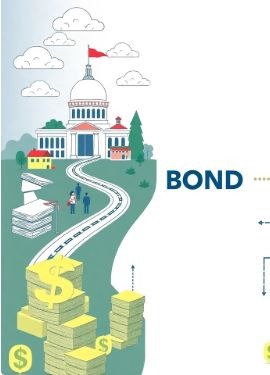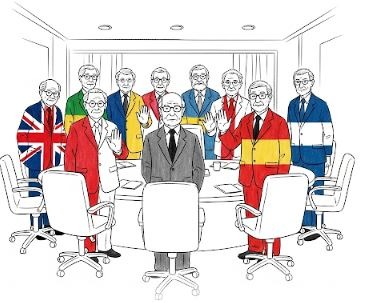Treasury Bonds - It's Dominance & Dollar Subjugation
The Bond of Bonds., It has dominated the world over decades and now faces challenges to its dominion and its bedrock foundation. Will it continue to enjoy the same attention?
MONEYMONEY




U.S. Treasury Bonds - The James Bond of bonds
Think of it as the U.S. government asking for a loan. It says: “Lend me $1,000 today, and I’ll give you $1,000 back later with interest.” In return, they will hand over a bond, a paper pledge. A special "I OWE YOU" paper. When you buy the bond, you're giving the US government some of your money, and they give you this IOU bond paper, which says: How much money they borrowed from you, When they will give your money back to you & How much money (interest) they will pay you while they have your money.
It's possible that they don't have enough money in their piggy bank (which is called the Treasury). This "borrowing" is done by selling US Treasury Bonds. They use the money to build and maintain bridges, hospitals, schools. Government officials and workers are paid salaries to keep the government running. It's also used to keep the country safe, by buying equipment for the military. So, the money keeps the whole country running smoothly!
Why borrow? The US has an advantage over others. In an nutshell, US Treasury bonds are the King of bonds because the US dollar is the King of money. See, the US dollar isn’t just America’s money — it’s the world’s reserve currency. That means everyone — banks, governments, and businesses across the planet — earn and store dollars because that’s what global trade and finance mostly run on. Oil, the most widely used commodity is also priced in dollars. Big international deals? Usually in dollars too.
So if you’re sitting on a pile of dollars, what’s the safest, easiest, most liquid place to park them? You guessed it — US Treasury bonds. That’s why US Bonds matter more than other countries’ bonds and they are super easy to buy and sell, because the market for them is gigantic. So it’s not just that Uncle Sam is, has been reliable — it’s also that he’s paying you back in the currency everyone already loves. Other countries’ bonds? Sure, they exist. But you’d have to convert your dollars, take on extra risk, and hope their currency doesn’t tank.
Why Buy US Treasury Bonds
Being rich isn’t about not owning money — it’s about being so powerful that everyone wants to lend you more.
The US borrows all the time — not because it’s broke, but because it can. Why spend only what you have when you can spend way more, and everyone still trusts you to pay it back? Why?
Because the US economy is huge, so people believe it can always pay.
Because the US prints the world’s reserve currency — it literally owes people dollars it can print more of.
Because there’s such global demand for “safe” US Treasuries that people practically want to lend to America… and even get low interest for the privilege.
So America borrows like a shopaholic with an unlimited credit card — and somehow , there's no credit limit. That’s the real deal: being the biggest, richest economy means, you just need everyone to believe you’re too big to fail. And Uncle Sam has mastered this game. Could they have misjudged? It can certainly happen.
Everything is about trust — and trust is fragile.
The US borrows and spends like crazy because the world has trusted it for decades. That trust comes from: Being the world’s largest economy, controlling the world’s reserve currency (the dollar), and having a track record of paying back (so far). But here’s the catch: The world is starting to question how long this can last?
If the US continues to keep borrowing more than they earn, at some point even the biggest fans start to wonder if they are living in denial. And that’s exactly what’s happening — other countries are watching US debt which is approximately USD 36 trillion spiral into the stratosphere, and it’s making them nervous.
And paying old debt with new debt is… risky.
Right now, the US pays the interest on its massive debt by… borrowing more. That’s called deficit financing — and while it works at the beginning, it becomes dangerous when, Interest rates rise and Debt grows so big that interest payments alone eat up a huge chunk of the country's budget.
So the US is kind of like a guy making minimum payments on many credit cards, and opening a new card or a new credit line to pay last month’s bill. So far it works because the banks (other countries & big financial players) still believe he’ll always pay. It will occur to you that, we as, ordinary citizens of the world's populace, are NOT allowed to behave like the richest country and should we somehow manage to do so, a Himalayan penalty will be imposed immediately. Now, deficit financing, is an interesting term with all its intended and unintended consequences. It's a topic that needs more attention at a later point of time.
They Say - “Relax fellas, you know I’m good for it.” - Do the lenders think so too?
Sure, other countries still buy US bonds — because they’re still the safest thing for now. This should not be mistaken for loyalty or stupidity. Lenders know this can’t go on forever. They know the US is running a dangerous game and we are starting to see them diversifying away from dollars, buying gold instead of more treasuries, through their central banks and hesitating to purchase at Treasury auctions or making demands for higher yields. They’re still playing the game… but with one foot already halfway out the door.
Is it Overbearing Pride?
The US has gotten used to being the top dog — so it assumes the world will always keep lending, lending them money and that the world has no other recourse.
But here’s the real risk: When trust finally cracks, it happens fast. The day countries not just stop believing in the US’s ability to repay and watch them continue to borrow, without discipline, they’ll dump Treasuries, demand higher interest, and the whole “too big to fail” illusion will collapse.
Overbearing Pride, haughtiness or just a blind spot? Call it what you will. A country, that rose to fame, on its merits and became the land of opportunities, may have reached the top and could be looking down the hill. Borrowing endlessly on the assumption that everyone else has no choice but to play along. And while other countries may still need dollars and Treasuries… they’re not dumb. They’re already hedging their bets, preparing ahead for the day if and when Uncle Sam finally stumbles. Unless,...
What happens when buyers don't want to buy newly issued bonds?
Here are a few scenarios ..
SCENARIO 1: Interest Rates Stay High — and Debt Snowballs
For years, interest rates were basically free. Uncle Sam could borrow and pay peanuts in interest. But now, to ensure the sale of the bonds, the treasury has to increase the interest rate and make it attractive, because of indifference, or fewer buyers or demands for a better deal. And guess what, the higher interest payments adds to the already existing debt and have a snowballing effect. The US has so much debt that just paying the interest, costs more than the entire US defense budget.
If rates stay high or go higher, the US ends up borrowing more and more just to cover interest — like a guy taking payday loans to pay off his older payday loans.
The Ripple effect - What does it mean to me?
Okay, so more money has to be paid to the guys from whom the US has borrowed. This effectively reduces the amount of money available to fund medical aid, assist weaker sections of the society and a funding for a whole bunch of other necessities, like infrastructure maintenance and other areas where the money needs to go. You must admit, it's not good. Beyond this, the interest rate that the US government pays on its borrowings has a chain reaction on daily living, in terms of higher costs of borrowing money, leading to higher mortgages, costlier loans, higher costs of goods and a whole bunch of unintended consequences, like increase in cost of living. The Treasury bond interest rates are the baseline for all other loans in the economy, like car loans, home loans, and business loans. When treasury bond interest rates go up, generally, all other interest rates tend to follow suit. When they go down, other rates tend to go down too. It's all connected, like a chain reaction, starting with the Fed and the super safe government loans.
SCENARIO 2: The Dollar's throne Gets shaky.
The dollar is king of global trade and has been used to sell and buy goods in the international trading system. With fewer buyers of the bonds, they will no longer, feel the need to hold on to dollars and will start to think of, offloading the bonds they already hold. With this, other countries will look at avoiding the current system and decide to buy directly from each other without using the dollar. This will lead to the lesser dollar usage and should this trend continue, the dollar will start to lose its significance. If more trade and reserves shift away from the dollar, there’s less demand for US bonds, because now countries will avoid holding money in dollars.
Without that constant foreign buying spree, the Treasury’s auctions start to fail. The world basically says: "We’ve had enough of funding your party. Find someone else".
Eventually, The "Uh-Oh" Moment.
Uncle Sam has this weird family habit. Every so often, his housemates (Congress) start arguing about whether he should be allowed to pay his bills, even the ones he's already promised to pay! The US Congress (made up of the House of Representatives and the Senate) is responsible for making laws, and critically, for deciding how the government spends money and how much it can borrow. So, they're like the family members who have a say in the household/country's budget.
In simple terms, it means that the US government has already incurred debts (bills) because Congress (his housemates) approved all the spending. But then, Congress starts fighting and sometimes threatens not to allow the government to borrow the money needed to pay those overdue bills and incur some more.
It's a unique and often criticized aspect of the US fiscal system, as it creates a self-imposed risk of default on obligations the government has already committed to. Then, things get really tense. There's a "default scare", where it looks like Uncle Sam might actually miss a payment. And the family just can't seem to agree on a budget to fix the money problems in the long run. They're stuck in gridlock, pointing fingers at each other instead of fixing things.
Nervous Lenders: "Are You Kidding Me?!"
Now, remember all those people who trusted Uncle Sam and bought his IOUs? They're watching this family drama unfold, and they're getting seriously worried.
Their thought process goes something like this: "Wait a minute... these guys can't even agree to pay their old bills? They're fighting over basic money management? If they're this chaotic, why on Earth should we keep lending them new money? What if they just decide not to pay us back, or if their constant fighting makes their country's money worthless?" This is when the nervousness overcomes the patience of global lenders.
What Happens IF Nobody Buys Uncle Sam's IOUs?
This is the scary part. If the world stops trusting Uncle Sam:
No New Money: When he tries to sell new IOUs to get cash for running the country (like paying soldiers, Social Security, or keeping the lights on), there are hardly any buyers. Or, the only buyers want an insane amount of interest because they see him as a huge risk now.
Uncle Sam Can't Pay His Bills: He literally runs out of money. Payments for social security, military salaries, government contracts – they all stop or are severely delayed. The government essentially grinds to a halt.
Global Economic Earthquake:
The U.S. Dollar Crashes: The dollar is the world's most trusted currency because of those super-safe IOUs. If the IOUs aren't safe, the dollar isn't either. Its value would plummet, making everything we buy from other countries (like electronics or gas) super expensive.
World Markets Panic: Every major bank, company, and country relies on U.S. IOUs as the "safest place to put money." If they're risky, then everything feels risky. This could trigger a massive global financial crisis, worse than anything we've seen.
Interest Rates Skyrocket for Everyone: If Uncle Sam has to pay crazy high interest, then everyone else (businesses, regular people buying houses or cars) will also have to pay way more to borrow money. The whole global economy would seize up.
The Fed's "Magic Money" Runs Out of Magic:
Sure, the Fed (Uncle Sam's central bank) could try to step in and print tons of digital money to buy these IOUs.
But if the world truly believes Uncle Sam is irresponsible, just printing more money won't fix the trust issue. In fact, it could make things worse by making people think the dollar is becoming worthless. It would be like trying to pay your bills with Monopoly money – eventually, no one accepts it.
The Bottom Line: This "no one buys our bonds" scenario isn't just about money; it's about trust. If the world loses faith in the U.S. government's ability and willingness to manage its financial obligations, the consequences would be catastrophic for the U.S. and the entire global financial system. It's why political leaders work furiously to avoid such a breakdown, even if they often push right to the brink.
The Cynical Takeaway
America’s been living on a magic trick: ---- "As long as everyone believes we’re good for it, we can keep borrowing forever."
But here’s the punchline:
Trust is like credit — easy to spend, hard to rebuild when it’s gone. So yeah, the rest of the world still smiles and buys Treasuries — for now.
But don’t mistake polite smiles for blind loyalty. They’re watching. Waiting. And quietly asking themselves:
"When do we stop playing this game?
It's very, very hard to find a positive impact in such an extreme situation.
Perhaps a complete rethinking of global finance? In a truly desperate situation, it might force the world to come up with entirely new ways of managing money and debt, but the cost would be immense.
For a very, very small group of people who had no exposure to the US economy or bonds: They might be unaffected directly, but the global downturn would eventually touch everyone.
In summary, the scenario where no one, is willing to buy US Treasury bonds is a doomsday scenario for the global financial system. It implies a complete breakdown of trust and confidence, leading to severe negative consequences for everyone involved and the entire world economy. It's something that governments and central banks work very hard to prevent, because the implications are so devastating.


